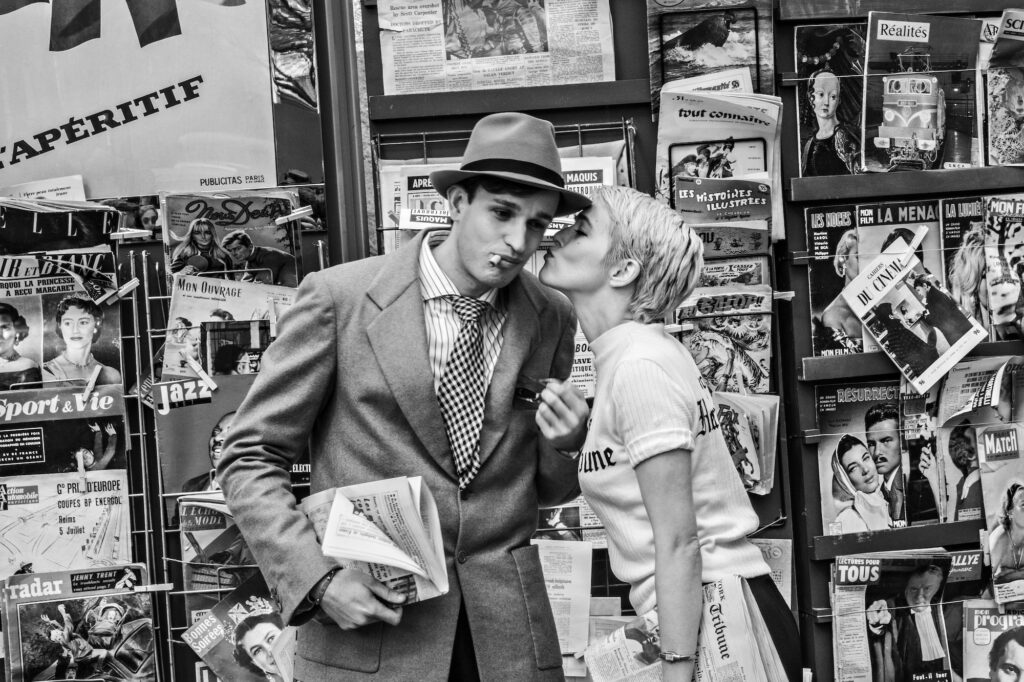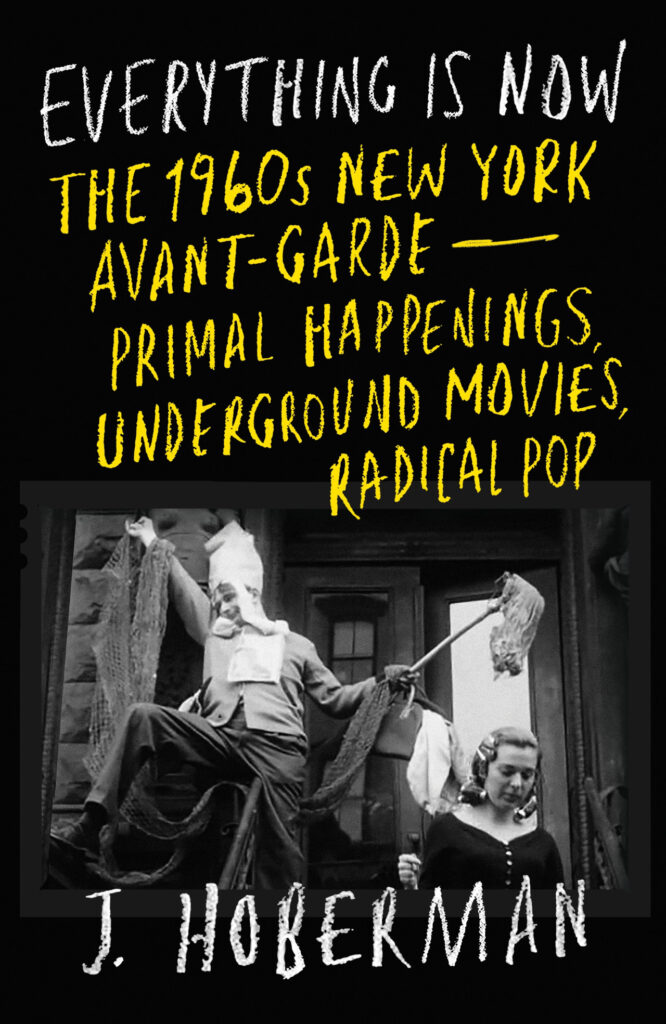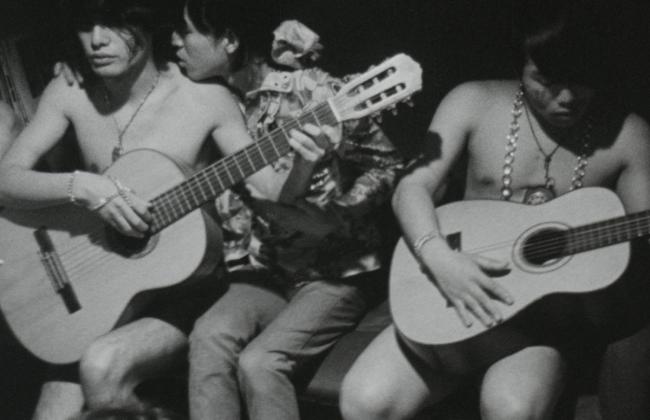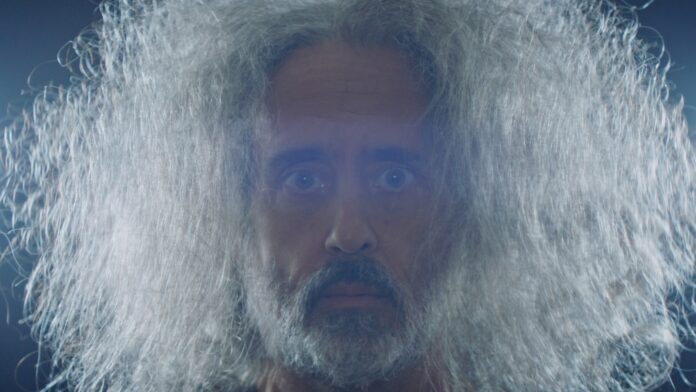The Big Kahuna of fall Bay Area film festivals is always Mill Valley Film Fest (Thu/2-October 12), an outlier among such affairs in that being scheduled towards the start of awards-campaign season, it invariably attracts an unusual number of high-profile upcoming releases and starry guests. That is certainly true this year, as the event starts out this Thurs/2 with Hamnet, the adaptation of Maggie O’Farrell’s novel—a historical fiction about Shakespeare (played by Paul Mescal)—that is already considered a front-runner in the Oscar race. Director Chloe Zhao (Nomadland) and co-star Jessie Buckley will be present both that night and at a matinee the following day.
That’s just the first of many gala occasions, which will also include another acclaimed literary translation, of Denis Johnson’s Train Dreams; Old Boy director Park Chan-Wook’s No Other Choice; Bill Condon’s latest Broadway musical adaptation Kiss of the Spider Woman; a spotlight on Australian actress Rose Byrne, with her new vehicle If I Had Legs I’d Kick You; Richard Linklater’s fictionalized salute to the early 1960s French Nouvelle Vague; in-person tributes to veteran director Spike Lee, emerging one Eva Victor (Sorry, Baby) and suppressed Iranian auteur Jafar Panahi’s (with his new It Was Just an Accident). The official closing night selection on Sun/12, Hikari’s Japan-US coproduction Rental Family, offers Brendan Fraser—considerably downsized from his Oscar-winning turn in 2023’s The Whale—as an American actor who finds surprising employment in Tokyo.

Other big titles include Luca Guadagnino’s After the Hunt, a “cancel culture’ drama with Julia Roberts; Poor Thing visionary Yorgos Lanthimos’ latest provocation Bugonia; acclaimed Danes Joaquim Trier and Renate Reinsve’s new collaboration Sentimental Value; an animated version of Orwell’s Animal Farm featuring an all-star voice cast; Is This Thing On?, a new directorial effort from Bradley Cooper; Peter Hujar’s Day, Ira Sachs’ imagined glimpse of artistic movers and shakers in mid-1970s Manhattan.
There are splashy lead roles for Colin Farrell as a compulsive gambler, Ethan Hawke as famed songwriter Lorenz Hart, Ralph Fiennes as a WWI-era choirmaster, and Jeremy Allen White as Bruuuuuuce in Edward Berger’s Ballad of a Small Player, Linklater’s Blue Moon, Nicholas Hytner’s The Choral, and Scott Cooper’s Springsteen: Deliver Me From Nowhere, respectively. Musicians are also the focus in documentaries Metallica Saved My Life, Everywhere Man: The Lives and Times of Peter Asher (about the legendary 1970s record producer), and Sun Ra: Do the Impossible.
Other nonfiction features run a wide gamut in theme, including baseball (Diamond Diplomacy), the legalities of birth (Arrest the Midwife), abusive prison systems (The Alabama Solution), cryptocurrency (Everyone Is Lying To You For Money), Ukraine war casualties (Children in the Fire), technology’s fight against aging (Forever Young), climate (Yanuni) and transgender (State of Firsts) activism, celebrated photographers (Love+War, Steve Schapiro: Being Everywhere), a circus elephant’s return home (The Ramba Effect), “Stand Your Ground” shooting controversies (The Perfect Neighbor), and more.
Beyond several of the above-named, there are numerous films from and/or about the Bay Area, including Tony Benna’s posthumous portrait of a local eccentric Andre Is An Idiot and Ari Gold’s single-shot North Beach musical Brother Versus Brother, in which he traverses North Beach singing songs with and by his sibling Ethan. Mill Valley-based director Tatti Ribero’s Valentina is a narrative about bureaucracy at the border.
But as ever the scope is very international, encompassing contributions from the usual-suspect countries as well as Iceland(The Love That Remains), Nigeria (My Father’s Shadow), Argentina (The Message), Turkey (Confidante), Taiwan (Left-Handed Girl), Egypt (Happy Birthday), Peru (Runa Simi), Tunisia (Promised Sky), Hungary (Orphan), Portugal (A Luminous Life), Chile (The Mysterious Gaze of the Flamingo), Palestine (Once Upon a Time in Gaza), et al. Among the lesser-sung features we were able to preview, standouts were Hasan Hadi’s Iraqi The President’s Cake, a bittersweet child’s-eye adventure in the tradition of The Bicycle Thieves, and Lilian T. Mehrel’s Honeyjoon, a thorny reunion between Persian-Kurdish mother and Westernized daughter in the idyllic Azores.
As ever, MVFF also offers shorts bills, programs for children and families, emphases on social/environmental justice subjects (in the Active Cinema section), commitment to gender equity (just over half the 138 films are from women or non-binary directors), a Latino Viva el cine! sidebar, and sundry live events including panels and workshops—one being a masterclass with Jon M. Chu of Crazy Rich Asians and Wicked. MVFF48 runs Oct. 2-12 at various Marin County locations, plus 14 shows at Berkeley’s BAMPFA. For full program, schedule, venue and ticket information, go here.
If you would much prefer to skip so much new screen fodder in favor of golden oldies, however, The Stanford Theatre in Palo Alto has your back. Starting this Fri/3 with a double bill of 100-year-old sagebrush gems—the latterday William S. Hart vehicle Tumbleweeds and Zane Grey-derived Tom Mix vehicle Riders of the Purple Sage—and running through December 19, its “Classic Western” retrospective spans from the silent era to the early 1960s, when Sam Peckinpah made his feature directorial debut with Ride the High Country and John Ford contributed one of his last, The Man Who Shot Liberty Valance. In between, there’s a surplus of titles famous (Shane, High Noon, Stagecoach, Red River), cultish (Johnny Guitar, One-Eyed Jacks), noirish (Pursued, The Treasure of Sierra madre), underrated (Devil’s Doorway) and baroque (Duel in the Sun). For a complete schedule, go here.

An era of drastic cultural change that helped largely kill off the traditional Hollywood western is spotlit in two notable events this week. First there’s a visit from longtime Village Voice critic J. Hoberman. His new book Everything Is Now: The 1960s New York Avant-Garde is a whirlwind chronicle of that decade’s revolutionary shifts in Big Apple creativity—encompassing not just big names like Warhol, Dylan and Ornette Coleman, but myriad lesser-remembered iconoclasts who shook up who pushed forward the realms of visual art, experimental film and theater, jazz, multimedia “happenings,” et al. While in retrospect the era’s trends have been wrapped in “peace & love” packaging (at least their West Coast incarnations), Hoberman makes clear how confrontative this Manhattan scene was, taking advantage of cheap rents (or squatting) in derelict pre-gentrification neighborhoods to stretch boundaries, making bold political and anti-censorship statements. Police raids of events were frequent—hard as it may be now to imagine a public-park gathering of folk musicians constituting a threat to the social order.
His presentation at Gray Area under SF Cinematheque auspices this Fri/3 will feature a screening of Ron Rice’s 1960 The Flower Thief, an energetic hour-long whimsy that has future Warhol “superstar” Taylor Mead gamboling about North Beach’s hepcats haunts, Playland, and such in what was shot in the late 1950s as a kind of last hurrah for the local “Beat” scene—which was dying from gawking-tourist overrun, though curiously a similar cafe-poetry-reading milieu was simultaneously just getting started in NYC. Though eventually overshadowed by Jack Smith’s notorious Flaming Creatures, Kenneth Anger’s Scorpio Rising, and Warhol’s Chelsea Girls, among other “underground” hits, this short feature’s success laid path for them. It will be shown with Smith’s debut short Scotch Tapa (1959-1962), a brief glimpse of figures crawling over rubble in what would soon become Lincoln Center, their antics set to a cha-cha soundtrack.
Two nights earlier on Wed/1 Hoberman will also appear at Berkeley’s BAMPFA, his reading and discussion accompanied by four 1964 relics from important NYC filmmakers: Ray Wisniewski’s Doomshow (a record of a key artists’ group exhibition), Ken Jacobs’ Little Stabs at Happiness (featuring performer Smith), Michael Snow’s New York Eye and Ear Control, and Jonas Mekas’ Award Presentation to Andy Warhol, featuring several then-denizens of the “Factory.” More info on that program is here.

Also at BAMPFA next Wed/8 will be a rare screening of Michio Okabe’s Crazy Love, a 1968 “queer pop collage epic” that functions similarly as a sort of overview of Japan’s own counterculture radicalism in that era. It offers a panoply of street theater, genre parody, drag camp, same-sex eroticism, and a whole lotta nudity, all set to the needle-dropping accompaniment of global pop sounds heavy on the Beatles and Monkees. The frequent presence of stunned passers-by attests to the fact that these artistic gestures had the power to shock even supposedly jaded Tokyo residents at the time.
Quick takes on a few new commercial releases all opening this Fri/3:
Anemone
The big news with Ronan Day-Lewis’ feature directorial debut is that it is the first film in almost a decade for his father Daniel, who announced his retirement after Paul Thomas Anderson’s Phantom Thread in 2017. They also co-wrote the script for this drama in which the senior D-L is Ray Stoker, a former British Army officer suffering apparent PTSD who abruptly withdrew from life to live as a hermit—abandoning his spouse (Samantha Morton) and newborn child. Now brother Jem (Sean Bean), who took them on as his own, treks deep into a northern England forest to attempt wooing Ray back in the hopes that he might help the adult offspring (Samuel Bottomley) that he’s psychologically messed up with his conspicuous absence.
Being the child of a multiple Oscar winner (and mother Rebecca Miller, herself an accomplished writer-director) might make a newbie filmmaker feel a wee pressured. Indeed, Anemone’s main problem is that it is so supremely self-conscious, every mannered shot and acting moment prematurely announcing “masterpiece!” It is beautiful to look at, and of course these are fine actors. But there’s very little room for the characters or drama to breathe naturally, particularly as the script makes Ray something of an actor’s vanity showcase–he’s ultimately made both guilt-bearer and innocent martyr to the UK’s suppression of Irish independence.
Between the weighted silences and stagey monologues, this feels like a ponderous theater piece even as Ronan slathers on gratuitous cinematic “style.” It’s not a bad movie, but an overreach that turns something which ought to have been powerfully simple into a showy display of endlessly fussed craft. Anemone opens Friday at Bay Area theaters.
Steve
Another impressive actor of Irish extraction, Cillian Murphy, reunites with Belgian director Tim Mielants on this drama based on a novella by Max Porter. Their prior collaboration, last year’s Small Things Like These, was a quietly forceful period piece involving abuses at a Roman Catholic home for “wayward girls.” Here, Murphy’s character is the head teacher at an alternative facility for troubled boys—volatile youths getting a last chance here after failing every other kind of school and juvenile-detention setting. Tracey Ullman and Emily Watson are among the staff; Jay Lycurgo is excellent as the most prominent among the trigger-tempered “lads.” Adding to the tensions on this particular day are threats of a funding shutdown, and a TV crew that’s perhaps unwisely been invited to film this progressive institution, which often seems on over the verge of chaos.
Murphy is fine as usual. But his character is overloaded with issues (a drug and \alcohol problem, recovery from a tragic accident, etc.), while the script in general is piled way too high with melodramatic incident. Mielants, who exercised judicious restraint on Small Things, here inexplicably cranks the volume to 11 at all times—there’s seldom a moment when the camera isn’t lunging, the cast yelling, and all other hell breaking loose. The onslaught quickly becomes fatiguing, and prevents deeper involvement in what should be a touching story. Again, this isn’t a bad movie—but given the subject matter and those involved, it’s a disappointing one. It begins streaming this Friday on Netflix.
Plainclothes
There is not much finesse, but eventually a whole lotta punch, to Carmen Emmi’s 1990s-set indie first feature. Hunky young cop Luke (Tom Blyth) is a young undercover cop forced by his superiors to lure men into compromising behavior at a local mall. He’s conflicted about those duties—which demand he brazenly flirt with, then arrest total strangers for “homosexual acts” he’s seemingly begged for—even before he meets one potential mark he’s genuinely attracted to.
That would be Andrew (Russell Tovey), an unlikely crush in that he’s an average-looking, fortysomething milquetoast. Nonetheless, it’s Luke who loses his head over this entanglement, despite being closeted both on the job and within his blue-collar family. Plainclothes is an uneven debut—rather thinly written and stylistically hyperbolic at times. But for all its faults, it arrives at a conclusion that packs considerably more power than you were probably expecting, and is well worth the wait. It opens Fri/19 at SF’s Apple Cinemas Van Ness and Rialto Cinemas in Sebastopol.
Good Boy
Amongst all these hefty male lead turns, there is none better than that given by Indy—a red-haired dog of the Nova Scotia Duck Tolling Retriever breed—in this horror movie by his real-life owner, director Ben Leonberg. His onscreen owner is played by Shane Jensen as Todd, a man of 30 or so who moves to his late grandfather’s (Larry Fessenden) old place in the country to recuperate from an unspecified illness. But Todd only gets worse, growing winded at the least exertion, sometimes coughing blood. Does he have cancer? We don’t know. But Indy soon knows something his master doesn’t, that this supposedly haunted house really is spooked by ghouls only the dog can hear and sometimes see. Prior generations of Todd’s family died “pretty young” there, and it is clear some malevolent entity wants to claim his last breath, too.
Just 73 minutes long, Good Boy nonetheless feels like a full meal, and certainly more than a clever gimmick. It is ominously atmospheric, surprisingly touching, and has a knockout star performance. While he no doubt required a whole lotta takes (and treats) to get there, Indy delivers a full gamut of engaging emotions, including the brave and resourceful as well as occasionally panicked. Whatever supernatural power he and Todd are up against, this highly expressive canine suggests he’ll do his best to protect them both. This isn’t just a neat little scary movie, it’s the most vivid depiction of the bond with Man’s Best Friend—from that friend’s POV—that’s come along onscreen in some time. Good Boy opens Friday at Bay Area theaters.







